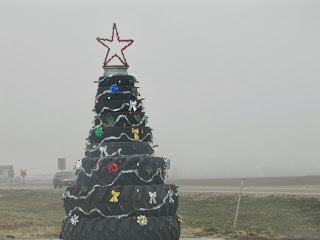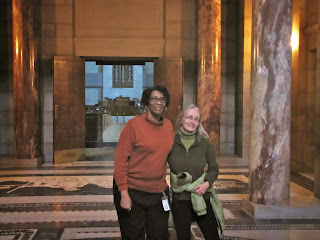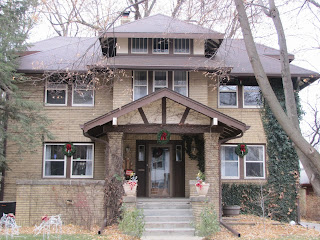I have to admit
to a failing. I thought that Nebraska
and much of the plains area was the place where people were from, not a place
that people stayed. I erroneously
inferred that Nebraska would not be a place preferred really by anyone who
could be somewhere else. I’ve caught
myself smiling the last few days as I talked to farmers, shopkeepers, museum
volunteers and just folks. Smiling
because I’ve been laughing at my ignorance and smiling because I kept finding
people IN LOVE with Nebraska. Smiling
because I kept seeing beautiful places and signs of prosperity.
 |
| First Tire Tree I Have Ever Seen! |
As farm businesses appeared along the highway they would
announce the coming of a town.
Little towns had already begun putting up their holiday lights and barns
displayed stars and wreaths. Posters
announcing Christmas events were plastered on store windows. Casual
conversations would be interrupted to make plans for school concerts or
parties. I overheard talk of fundraisers
to benefit the needy in their towns.
Plans and worthwhile events were afoot.
I felt comfortable in these little towns. Impressed with the pride with which they maintained buildings and relationships.
 |
| County Building of Hamilton in Aurora |
The radio station
played country and western songs, interspersed with the current prices of beef,
hogs, wheat and corn (some up cents and some down dollars). Worrisome news for some, I suppose. One station announced that news was next and than
played an advertisement for nursing homes.
That was the news! I couldn’t
seem to catch world news on any channel.
Distant relatives of mine, settled in Aurora, Nebraska. While at the local museum, I bought a book with accounts of early settlers. Some of the names I know. Some of these people were in the photos that I donated to the Aurora Museum a few years ago. I talked with a local eighty-year-old third-generation farmer.
Being a houser (see earlier post on housing and housers) I find that it is worthwhile to connect people to the historical record of their home. One of the reasons that I stopped in Aurora was to try and make the information on the house photos (that I donated a few years ago) more accurate. The extraordinary barns and simple white clapboard houses in the photos had no addresses. With the help of the third generation farmer and museum curator we were able to put an address on a couple of the photos and determine if the buildings still existed or not. One of the photos was of a group posing in front of a house.
The Nebraska State Capitol makes it clear that Nebraska expects to have people around for at least 500 years. The architect was told to use materials that make the building last that long! Those columns are marble from Italy and all of the floors are stone.
 |
| Bessie State Native Plant Nursery/Camped Near By in a Pine Forest |
Distant relatives of mine, settled in Aurora, Nebraska. While at the local museum, I bought a book with accounts of early settlers. Some of the names I know. Some of these people were in the photos that I donated to the Aurora Museum a few years ago. I talked with a local eighty-year-old third-generation farmer.
Being a houser (see earlier post on housing and housers) I find that it is worthwhile to connect people to the historical record of their home. One of the reasons that I stopped in Aurora was to try and make the information on the house photos (that I donated a few years ago) more accurate. The extraordinary barns and simple white clapboard houses in the photos had no addresses. With the help of the third generation farmer and museum curator we were able to put an address on a couple of the photos and determine if the buildings still existed or not. One of the photos was of a group posing in front of a house.
I had assumed that the house was on a corner. The house was the town house of the farmer,
John Read. After juggling a number of
plat books, phone books and ancestry data, we located the house. I later drove by it and this is what it
looks like now.
Still standing, much
smaller than I thought, not on a corner and in the middle of a porch
renovation. I already knew from real
estate records that the original graceful columns were gone and had been replaced with strange lattice-like columns, but I didn’t
expect to see the whole porch gone!
Houses do change. I wonder what
they will do now. The photo with the
original porch is being passed to the current owners. Maybe they will redo the porch in the
original style. Maybe.
John Paul Jones, another relative, originally lived in a sod
house. He was a civil war veteran
homesteading under the deal made by President Lincoln for Union soldiers. A soldier could “prove up” a plot by building a structure on it. He could own the land within five-years or even less with credit for the years that he had fought in the war. We have stories of that sod house.
Eventually John Paul could afford to have a clapboard house built on the farm.
He hired Arthur Hickman and his dad to build the house. Arthur and John Paul's son, Walter, both must have both had an eye on Arvilla Read, daughter of the John Read mentioned above. Walter and Arvilla eventually married and moved to Grand
Junction, Colorado. Walter became a grocer and then a postmaster. When he died in his fifties, Arvilla ran a boarding house for teachers. Somehow that Nebraska builder, Arthur Hickman, now a widower heard about her, wooed her and asked her to marry him. By this time he was a wealthy man. Here is his former house in Lincoln, Nebraska. I took this photo just to compare with the one I have at home.
Arvilla and Arthur moved away from Lincoln to Pasadena, California. We have a narrative of the two of them flying to Hawaii
on one of the first commercial Pan-Am flights with a group of expats called the “Nebraska
Club”. The flight was twelve hours long
with "a pilot that looked like Lindy".
I tell you these details to help you understand why I
thought everyone was trying to get out of Nebraska and they never went back.
 |
| Main Hall |
The Nebraska State Capitol makes it clear that Nebraska expects to have people around for at least 500 years. The architect was told to use materials that make the building last that long! Those columns are marble from Italy and all of the floors are stone.
 |
| Gloria and I |
I
toured the capitol building of Nebraska.
Wow! Talk about state pride. The building is stunning. Gloria gave me a tour. I talked both with her and one of the
maintenance men, who took our picture.
Both were natives, long time employees of the state and proud of their home
state.
 |
| Floor Detail Designed By a Woman Working with the Architect |
In Nebraska
City I stopped for coffee and a cruise through town. When I entered the coffee shop there was a
large table of ladies all talking back and forth like they did this every day
or every week. They were the only
customers at the moment. The shop owner
asked where I was from. I guess it was
rather obvious that I was new in town or I would have been sitting at that
table with the local women already. After small
talk, she just gifted me the Nov./Dec. issue of the Nebraska Magazine (value
$5.95). I liked Nebraska. I liked the small town hospitality. I hope that I get back some day.


.jpg)


Sweet reflections and wisdom. Thanks! Jarla
ReplyDeleteMost welcome, Jarla. Good to change one's views at any age.
ReplyDelete